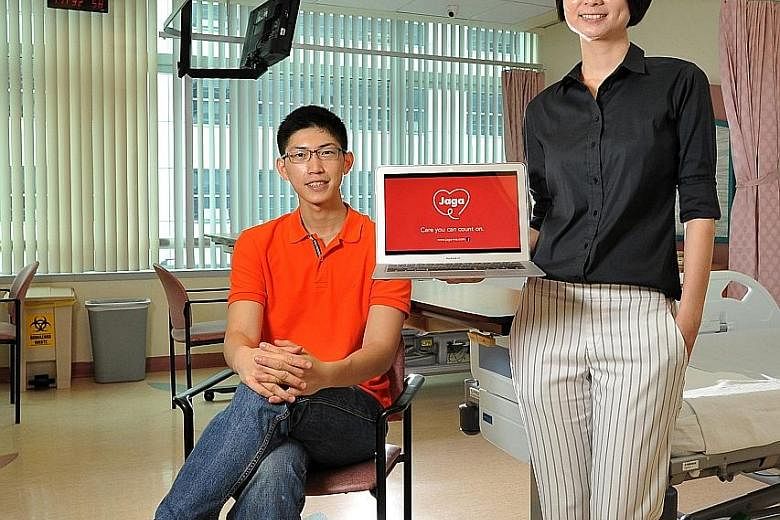SINGAPORE • A bedridden loved one cannot cough up phlegm and has difficulty breathing. A diabetic with wounds needs his soaked bandages changed.
Instead of rushing the patient to hospital, caregivers can now engage a nurse to make a house call with the click of a button.
This is how a new website, Jaga-Me, hopes to give family caregivers access to nursing services in non-emergency situations.
"Jaga" in Malay means "to guard", and the website founders aim to ease the hospital bed crunch by reducing unnecessary admissions.
"Many times, the problem is not severe, but the family is so anxious and clueless about home care that their first thought is to go to the hospital, although a nurse will suffice," says one of the site's two founders, Singaporean Kuah Ling Ling, 29, who is a trained nurse.
The other is Mr Julian Koo, 28, also a Singaporean, who worked previously in a statutory board for two years.
Both quit their jobs this year to run the website full-time.
As a nurse who worked in a home nursing foundation for five years, Ms Kuah has often seen the stress felt by caregivers when planning home-care arrangements for bedridden patients. These patients are often elderly, suffer from chronic diseases or have undergone surgery.
She says: "Hospitals may not spend enough time teaching the family how to care for the patient after discharge, so they are lost when handling medical systems, like catheters, on their own.
"Caregivers often don't know what the patient needs, yet must buy medical equipment and find a suitable nurse. This is very taxing on top of daily care duties."
To address this, first-time Jaga Me users are visited at home by a nurse, who assesses the patient's condition and helps the caregiver to identify the medical services and equipment needed.
These can be bought from the site, which lists certified sources of medical equipment, sold at lower prices because of partnerships with suppliers.
Users can also engage the site's pool of freelance nurses for tasks such as feeding tube insertion, intravenous medication administration and suture removal.
Rates, the founders say, are lower than in private-sector clinics and hospitals.
Jaga-Me nurses are licensed and have at least three years' experience in an acute medical or surgical ward.
While this assures users, Ms Kuah says it also helps freelance nurses to find patients.
Ms Denise Wong, 32, who joined the site's team of nurses in April, says: "There's flexibility of time, and I'm able to dedicate care to one person. I also like how everything is electronically documented, so I can see the input of everyone who has previously cared for the patient."
Jaga-Me was launched in March and registered 12 users within its first month.
It beat 170 other ideas to win the top prize in a national healthcare and entrepreneurship competition last year, and came in third in an event supported by the Massachusetts Institute of Technology Hacking Medicine Institute in the same year.
Jaga-Me aims to hire a core team of 10 nurses and serve 300 users by the end of the year.
The founders are already in talks with several hospitals to promote its mobile app.
Madam Sally Gan, 59, says using the site has reduced the stress of caring for her 92-year-old mum, who is bedridden after a stroke.
Previously, it was challenging to take her mum to the hospital to change her feeding tube.
But now, Madam Gan engages a nurse through Jaga-Me to do the job at her home once every five months.
She says: "The tube is changed when it needs to be, and the nurse also gives my mother a check-up at the same time.
"So we get an update of her condition, and are able to react when, say, her blood pressure is low and she requires a transfusion. It's relieving and reassuring for me as a caregiver."
With more countries facing an ageing population, the founders expect home care to be a major focus of the global healthcare industry in the future.
Mr Koo says that the site's standardised processes and technology - such as patient assessment methods, equipment standards and nurse selection criteria - make it easily scalable across the globe.
"With the rise of the sharing economy - apps like Uber and Airbnb - people are more and more willing to leverage on technology and trust to get a home service done, even when it is for healthcare services," he adds.

